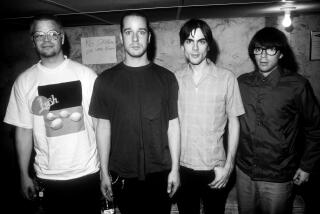Duff’s Difficult Transition to Rock Stardom
- Share via
How would you spend your spare time during the longest concert tour in rock annals, Guns N’ Roses’ draining, 28-month, globe-spanning “Use Your Illusion” marathon? The most sane might get some rest, others might go sightseeing, some might indulge their vices. GNR’s bassist Duff McKagan made an album.
Booking studios in L.A., London, Denver, Seattle and Dallas, McKagan recorded the recently released “Believe in Me.” While on the surface it might look like a typical vanity product by a privileged musician, its maker insists it stemmed from much more compelling forces.
“I must say that was a serious need,” says McKagan, dropping the casual, street-smart tone he’s used during most of a recent interview. Now he’s careful to relate precisely what happened when he returned to L.A. after Guns N’ Roses’ 1988 “Appetite for Destruction” tour and found that he’d been transfigured from a Sunset Strip nobody to Big Rock Star.
“There’s no school to get used to this . . . right?” he begins. “So we got back and I bought this big house, got this furniture, moved it all in, the door shut, there I was. OK. I have a house, and I have a new car, and a credit card. Wow. OK.
“Before, I never had the money or the time to go to the clubs in L.A. So I go, and all of a sudden all these people who thought I was a scumbag were my friends. And the girls all of a sudden were like, wow.
“I said, ‘Wow, this is different. Wait, wait, wait. It’s not different. They like me for something else. They don’t like me for me, Duff, this goofy guy. They like me for what happened and this big house and maybe I have a couple of bucks.’ It really hit me, man. It was L.A. classic. And it blew me away. . . .
“So I went back up to my big house and shut the door and I was all alone again. It was like keeping the dogs out. I had a little eight-track studio . . . and I went up there and the songs just started pouring out. At the risk of sounding corny, it was my heart. . . . So the album’s got a bit more than just Duff wanted to do a record.”
McKagan, 26, was satisfied just to get the songs down, but an impromptu recording of “The Majority” after a GNR studio session led to the eventual recording of the full album, released on Geffen Records. McKagan is treating it gently, doing limited promotion and avoiding the big push that he says others on his business team were urging.
“I’m not a (expletive) product to sell. A couple of times I decided I’m retracting it. You can’t mass produce somebody’s heart and soul. It’s a very delicate thing. I don’t need the notoriety.”
Notoriety is something that’s become synonymous with the volatile Guns N’ Roses, a band that’s often been portrayed as one step away from self-destruction. McKagan, who founded GNR with guitarist Slash and singer Axl Rose after moving to L.A. from his native Seattle, scoffs at that suggestion, but he savors the group’s unpredictability.
“Rock ‘n’ roll is a volatile thing, at least it’s supposed to be,” says McKagan, who plunged into the punk-rock circuit when he was 15. “It’s gotten too safe. Everybody’s used to these bands that are products--’OK, we’ll do that, OK, we’ll wear this.’ And they don’t cause problems ‘cause they’re too scared to make waves.
“Yeah, it’s volatile with GNR. Every night it’s anarchy on stage. Who knows what’s gonna happen? That’s rock ‘n’ roll, man.”
More to Read
The biggest entertainment stories
Get our big stories about Hollywood, film, television, music, arts, culture and more right in your inbox as soon as they publish.
You may occasionally receive promotional content from the Los Angeles Times.









